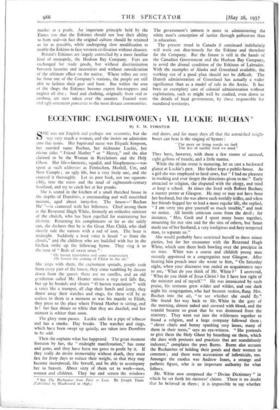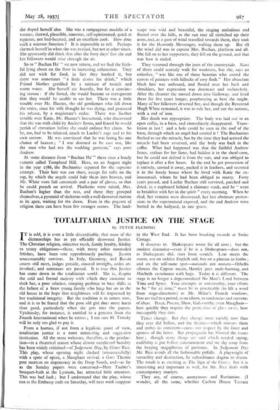ECCENTRIC ENGLISHWOMEN: VII. MCKIE BUCHAN*
By E. M. FORSTER
SHE was not English and perhaps not eccentric, but she was very much a woman, and she insists on admission into this series. Her baptismal name was Elspath Simpson, her married name Buchan, her nickname Luckie, her divine titles " Friend Mother " or " Mercy," and she also claimed to be the Woman in Revelations and the Holy Ghost. Her life—fantastic, squalid, and blasphemous—was spent at such addresses as Fatmacken, Muthill, Urr, and New Cample ; an ugly life, but a very lively one, and she enjoyed it thoroughly. Let us peer back, not too squeam- ishly, into the mists and the mud of eighteenth-century Scotland, and try to catch her at her pranks.
She is seated in the kitchen of a small thatched house in the depths of Dumfries, a commanding and well nourished matron, aged about forty-five. The house—" Buchan Ha' "—is crammed with her followers. Chief among them is the Reverend Hugh White, formerly an orthodox minister of the chdrch, who has, been expelled for maintaining her divinity. Returning his compliments so far as she safely can, she declares that he is the Great Man Child, who shall shortly rule the nations with a rod of iron. The hour is midnight. Suddenly a loud voice is heard "as from the clouds," and the children who are huddled with her in the kitchen strike up the following hymn. They sing it to the tune of" Beds of sweet roses" :
"Oh hasten translation and come resurrection Oh hasten the coming of Christ in the air."
She sings with them, the excitement spreads, people rush from every part of the house, they come tumbling by dozens down from the garret. there are no candles, and an old gentleman called Mr. Hunter misses a step and falls flat, but up he bounds and shouts "0 hasten translation" with q voice like a trumpet, all clap their hands and jump, they throw away their watches and rings, for these will be as useless to them in a moment as was his mantle to Elijah, they press to the place where Friend Mother is sitting, and lo ! her face shines so white that they are dazzled, and her raiment is whiter than snow.
The glory soon passes. Luckie calls for a pipe of tobacco and has a smoke. Day breaks. The watches and rings, which have been swept up quietly, are taken into Dumfries to be sold.
Then she explains what has happened. The great moment foreseen by her, the "midnight manifestation," has come and gone, and they have been too gross to profit by it. If they really do desire immortality without death, they must fast for forty days to reduce their weight, so that they may become incorporeal, like herself, and be able to accompany her to heaven. About sixty of them set to work—men, women and children. They bar and screen the windows * See The Buchaitites from First to Last. By Joseph Train (Published by Blackwood in 1846.) and doors, and for many days all that the astonished neigh- bours can hear is the singing of hymns :
"The more on living words we feed The less of earthly food we need."
They have, however, with them a few stones of oatmeal, eight gallons of treacle, and a little manna.
While the divine event is maturing, let us cast a backward glance at Luckie's past. Her father kept a public-house. As a girl she was employed to herd cows, but " I had no pleasure in working and ever forgot the directions given to me." Early attracted to religion, she disputed 'with the clergy, and tried LO keep a school. At times she lived with Robert Buchan; a master potter at Glasgow. He may or may not have been her husband, but she was above such worldly trifles, and when her friends begged her to lead a more regular life, she replied, "I am sorry you give yourself so much trouble," and took no notice. All hostile criticism came from the devil ; for instance, "Mrs. Cook and I spent many hours together, mourning for our sins and for the sins of others, but Satan made use of her husband, a very irreligious and fiery tempered man, to separate us."
She wouli probably have restricted herself to these minor pieties, but for her encounter with the Reverend Hugh White, which sent them both bowling over the precipice in no time. White was a coarse and childish young man. recently appointed to a congregation near Glasgow. After hearing him preach once she wrote to him, "On Saturday night, when your discourse was ended an acquaintance says to me, 'What do you think of Mr. White ? ' I answered, 'What do you think of Jesus Christ ? for I have lost sight of the minister and of myself." He was intoxicated by such praise, his sermons grew wilder and wilder, and one dark night his congregation, who had become restive, flung Mrs. Buchan into the air, "to see whether she could fly." She found her way back to Mr. White in the grey of the morning, almost naked and covered with blood, and the scandal became so great that he was dismissed from the ministry. They went out into the wilderness together to found a religion, and a large company followed them ; "clever chiels and bonny spanking rosy lasses, many of them in their teens," says an eye-witness. "She pretends to give them the Holy Ghost by breathing on them, which she does with postures and practices that are scandalously indecent," complains the poet Burns. Burns also accuses the Buchanites of holding their goods and their women in common ; and there were accusations of infanticide, too. Amongst the exodus was Andrew limes, a strange and pathetic figure, who is an important authority for what follows.
Mr. White now composed the " Divine Dictionary" in which he set forth his mistress' claims. There is no doubt that he believed in them ; it is impossible to say whether she duped herself also. She was a rampageous muddle of a woman, shrewd, plausible, amorous, self-opinionated, quick at repartee, not bad-hearted, and an excellent cook. How does such a mixture function ? It is impossible to tell. Perhaps she took herself in when she was excited, but not at other times. She apparently did think that after the forty days' fast she and her followers would arise through the air.
So to " Buchan Ha' "we now return, and we find the faith- ful lying about on the floor in increasing exhaustion. They did not wish for food, in fact they loathed it, but there was sometimes "a little desire for drink," which Friend Mother gratified by a mixture of treacle and warm water. She *herself ate heartily, but for a convinc- ing reason : if she fasted, she would become so transparent that they would be unable to see her. There was a little trouble over Mr. Hunter, the old gentleman who fell down the stairs, since his wife thought he was dying, and procured his release, by a magistrate's order. There was further trouble over Katie, Mr. Hunter's housemaid, who discovered that she was with child by Andrew lames, and feared he would perish of starvation before she could enforce her claim. So he, too, had to be released, much to Luckie's rage and to his own sorrow. He was convinced that he was losing his one chance of heaven ; "I was doomed to be cast out, like the man who had not the wedding garment," says poor Andrew.
At some distance from "Buchan Ha' " there rises a lonely summit called Templand Hill. Here, on an August night in the year 1786, the Buchanites repaired for the supreme attempt. Their hair was cut short, except for tufts on the top, by which the angels could hale them into heaven, and Mr. White wore full canonicals and a pair of gloves, so that he could preach on arrival. Platforms were raised, Mrs. Buchan's higher than the rest, and there they grouped themselves, a pyramid of skeletons with a well-favoured matron as its apex, waiting for the dawn. Even in the pageant of religion there can have been few stranger scenes. The land- scape was wild and beautiful, the singing melodious and floated over the hills, as the sun rose all stretched up their arms, and, as a gust of wind travelled towards them, they took it for the Heavenly Messenger, wafting them up. But all the wind did was to capsize Mrs. Buchan, platform and all. She fell on to her supporters, they fell on the ground, and that was how it ended.
They returned through the jeers of the countryside. Most of them could scarcely walk for weakness, but she, says an onlooker, "was like one of those beauties who crowd the canvas of painters with hillocks of rosy flesh." Her abundant black hair was unbound, and floated over her back and shoulders, her expression was downcast and melancholy. After the disaster she moved down into Galloway, and lived there for five years longer, prophesying as best she might. Many of her followers deserted her, and though the Reverend Hugh White remained, it was to rule her, and not the nations, with a rod of iron.
Her death was appropriate. The body was laid out in an open coffin, in a barn, and immediately disappeared. Trans- lation at last ! and a hole could be seen in the roof of the barn, through which an angel had carried it ! The Buchanites flocked to see the miracle, but by the time they had arrived the miracle had been reversed, and the body was back in the coffin. What had happened was that the faithful Andrew Innes, zealous for her fame, had hidden it in the sheaf-corn, but he could not defend it from the rats, and was obliged to replace it after a few hours. In the end he got possession of it entirely, carried it away, packed it in feathers, and secreted it in the lonely house where he lived with Katie the ex- housemaid, whom he had been obliged to marry. Forty years passed, and Luckie Buchan still survived, parched and dried, in a cupboard behind a chimney stack, and he "went to breakfast with her in the spirit" every morning. When he died, her remains were discovered, her last obstinate preten- sions to the supernatural exposed, and she and Andrew were buried in the kailyard, in one grave.







































 Previous page
Previous page